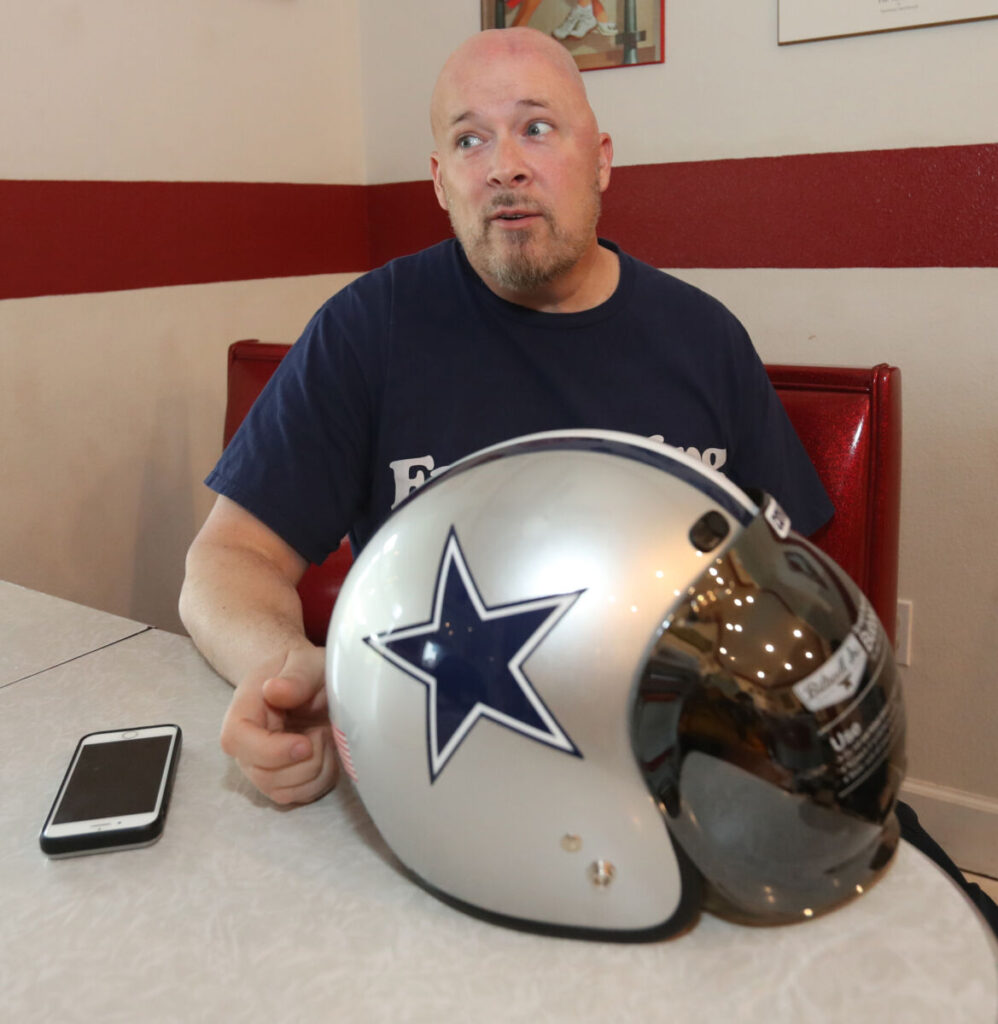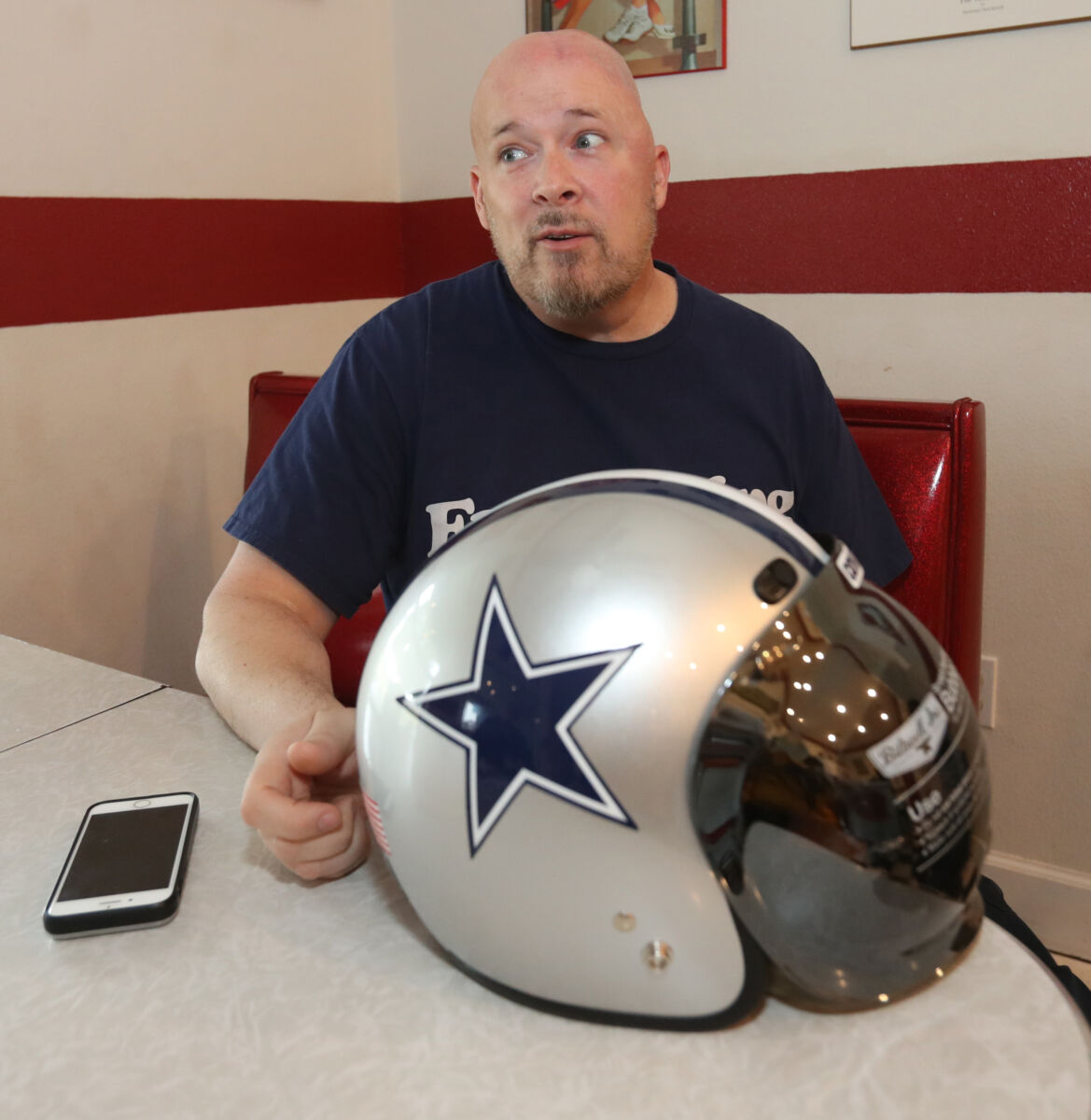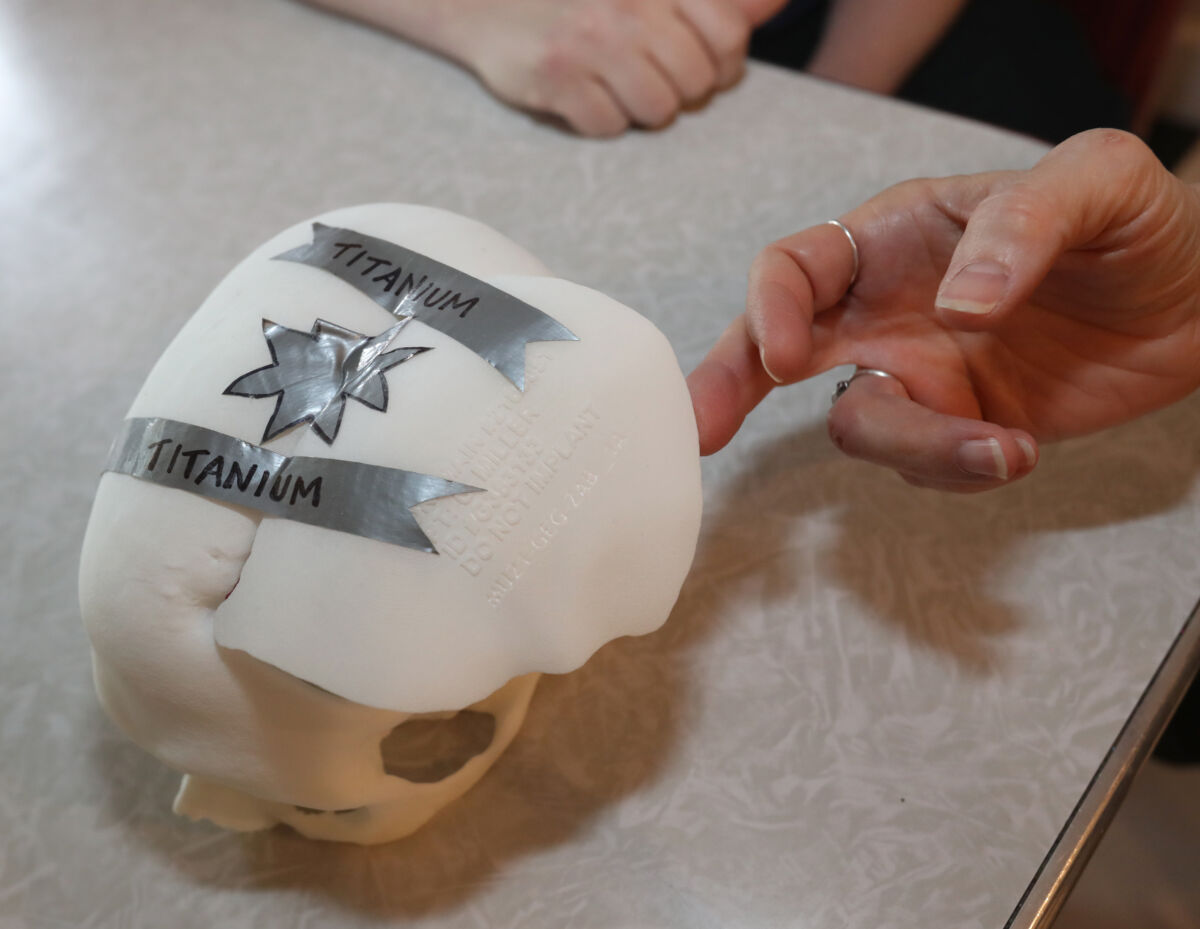Comic Relief: His sense of humor has helped Chris Miller endure 11 surgeries in 19 months, 9 of them on his skull

Chris Miller talk about his serious motorcycle accident while one of the custom helmet he was designing and trying to sell at the time is shown at his home in Belleview, Fla. on Tuesday, Dec. 21, 2021. Ironically he was not wearing a helmet when he had the accident. Chris Miller had the accident while out riding with a friend in May 2020. He has undergone 9 surgeries on a long road to recovery. [Bruce Ackerman/Ocala Gazette] 2021.

Chris Miller talks about his serious motorcycle accident while one of the custom helmets he was designing and trying to sell at the time is shown at his home in Belleview on Tuesday, Dec. 21, 2021. [Bruce Ackerman/Ocala Gazette]
His schtick has been honed through decades as a teacher at Howard Middle and Lake Weir High Schools, dean of students at Ward-Highlands Elementary, in his role with Career and Technical Education in Marion County Public Schools and as a tutor with the Department of Juvenile Justice. Not to mention being the only guy in a household that includes four feisty females; his wife Debra and their daughters Jessica, Elise and Audrey.
Miller is known for his one-liners, snappy comebacks, puns and affinity for wearing T-shirts adorned with quirky statements.
His former University of Florida roommate and best friend, Colby Theisen, said that when he first met Miller, “We warily eye-balled each other until I got to know his sense of humor. Sometimes he likes to kind of poke people just to find out how far he can go with them and he has a gauge on what kind of humor he can have with them. He wants to see where that line is and not go past it but go right up to it. He does have a unique sense of humor.”
After Miller had a near-fatal motorcycle accident on May 4, 2020, his good friend, family members and neurosurgeon, Dr. John T. Main, all said his sense of humor was a key element as he faced 11 surgeries in 19 months, nine of them on his skull, and battled the hard-to-treat staph infection known as MRSA.
Miller, who had traumatic brain injury (TBI), fractures in his face and a broken arm and ankle, still has no recollection of the accident. He has endured a subdural hematoma, intense pain, excess leakage of cerebrospinal fluid, having a brain “flap” replaced and the insertion of two shunts in his head. He has had titanium parts placed in his wrist and ankle and had to go to rehab to relearn how to walk.
All along that journey, even as he returned to work as much as he could, his sense of humor has sustained him and entertained those around him.
“Chris came into the hospital in very bad shape. I just happened to be at the hospital and took him immediately to the operating room. If he would have had to wait for me to arrive, he would have not made it. I did not expect him to make it, let alone be functional,” said Main. “Chris is a fighter and an extremely positive person. He and his wife are amazing people. He has been through multiple surgeries and he never gives up. His humor, I think, gets him through things. He is very funny.”
“As a daughter’s point of view, my biggest concern, as terrible as it sounds,” said Jessica Miller of the early days after her father’s accident, “I don’t care if he’s alive or not, I care about having my Dad. If he doesn’t come back as my Dad, that’s going to be almost worse for me, like I want my Dad! Then he came back full force, making jokes and everything, and I’m like ‘Thank God!’ He’s still here.”
The Crash
Miller and Theisen, who lives in Sanford, have shared many things in life. On that fateful Monday in 2020, with pandemic restrictions easing and businesses welcoming back customers, the two rode their motorcycles—for the first time ever together—from Miller’s home near Belleview to Mojo’s on Silver Springs Boulevard. As they rode back into Miller’s neighborhood, Miller, who had worn his helmet to the eatery but not on the journey home, crashed just inside the entrance to the subdivision.
“Chris and I, within a year of the date in May, had gotten our motorcycle permits. One of his favorite chicken wing restaurants, Mojo’s, had opened again, so he asked if I wanted to come up and go for a ride,” Theisen recalled. “I brought my motorcycle in the truck because I didn’t feel comfortable driving that far yet. It was early afternoon, late lunch kind of time. We both had our helmets on and rode over and had some wings and chatted for a while. He ran into a couple of friends there. In early evening we headed home. Chris enjoyed the feeling of riding without a helmet. Like when you’re in a car versus a convertible, it’s a completely different feeling. It’s kind of a freedom, and he enjoyed that sensation. And it had gotten dark so, for visibility I think, he decided not to wear his helmet on the way back.”
Theisen said Chris was maybe 20 yards ahead of him when they pulled into the entrance of the subdivision.
“It has a rather small entrance with a concrete median and a small “S” curve. He overcorrected in that turn and went off the left side of the road into a shallow ditch and I saw headlights and taillights flipping in the air. I pulled off and he was lying face down in the ditch,” Theisen said. “He looked unconscious and was groaning. I tried to get him to stay still and keep his face out of the grass and dirt so he could breathe. I called 911.”
After Chris was in an ambulance headed to Ocala Regional Medical Center, which has the only Level II trauma center in the trauma service area that includes Marion, Citrus and Hernando counties, and Theisen had given his account of the accident to a police officer, he had to go tell Debra Miller what had happened.
“He said, ‘Chris was in an accident,’” she recalled. “I said, ‘You’re kidding,’ and I was waiting for Chris to pull up. And he said, ‘No, we need to go to the hospital.’ I know I froze because then he said, ‘We need to go now.’”
She said Theisen could not tell her if her husband was alive.
Debra called Jessica, who lived near the hospital, and asked her to go there.
“I beat everybody there,” Jessica said. “I beat him,” she said, pointing at her dad.
A friend saw online that Jessica was the hospital and reached out.
“I said my dad was in a motorcycle accident and she said, ‘My mom’s there now. She’s a trauma nurse.’ So, my friend connected us to her mom,” Jessica shared.
As family members gathered, they learned Chris had a subdural hematoma, which is when blood builds up between the protective layers that surround the brain inside the skull.
“At that point, they didn’t know if they could save him or not,” Debra said.
“They drilled me open that night and took part of my skull off and let my brain swell, because if the skull had remained on it would not have had room to swell and I would have died,” Chris said.

A 3-dimensional model of a skull showing the skull flap that has been surgically implanted into Chris Miller’s head. [Bruce Ackerman/Ocala Gazette]
Debra was allowed in the hospital room with Chris on Tuesday, but he was nonresponsive.
“On Wednesday, he was intubated so he couldn’t talk but he could respond. He didn’t know who he was, who I was, that he had daughters, where he was,” she said. “Then he did start remembering and the strangest thing is that he never remembered the night of the accident and he could not ever say why he was in the hospital. One nurse asked why and he said, ‘medical procedure.’ He was very entertaining.”
On May 17, 2020, Chris was transferred to the Encompass Health Rehabilitation Hospital of Ocala, where he remained until June 3.
On June 9, he had surgery to place titanium plates and screws in his forearm and ankle. In early July, while recovering at home, he developed hydrocephalus, which is an excess of cerebrospinal fluid (CSF) in the brain that causes confusion and problems with coordination.
“I called my mom and then dad because I did not believe my wife of 28 years was my wife,” Chris recalled.
Between July 15 and 19, 2020, Chris had three brain surgeries, including a cranioplasty, which is a procedure to repair a skull defect by inserting bone or materials such as metal or plastic plates, insertion of a shunt to address the hydrocephalus and then emergency surgery when his brain began to bleed from the shunt surgery.
He said he was in a “good place for recovery” for several months “but resorption began to affect the bone flap, causing a divot of bone to develop.”
“To restore protection for my brain as well as symmetry and aesthetics, my natural bone flap was removed and replaced with synthetic bone on June 28, 2021. I asked if I could have my bone flap, maybe for my rearview mirror or a Christmas ornament,” he said mischievously. “Dr. Main was very nice but said no.”
As evidence that the Chris Miller humor DNA runs in his family, the ladies of the house took the plastic mockup of his skull, which includes a “lift-up” section of the bone flap, and turned it into an M&M dispenser that sits on a counter in their 1950’s-themed kitchen.
On Friday, July 30, 2021, Chris woke up with extreme swelling on one side of his skull.
“It felt like my head was a water balloon, with an inch or more of fluid on top of my skull. There was also a very large bump on my left temple. And then I awakened in bed to CSF having leaked out of my head through my incision. Dr. Main took apart my skull again and added adhesive to portions of the flap and removed a large cyst from my temple,” he said.
After three months of trying to control the leakage, CSF and blood cultures revealed two infections, one of which was MRSA. Chris was put on IV antibiotics. As the leaks continued, Dr. Main recommended that a second shunt be connected to the first one with a T-tube to drain the fluid. Chris was hospitalized for from mid-October to early November. In late December, he was still having some issues with swelling and leakage and working with his medical team to find solutions.
He said that, looking back, his “proudest survival thing” was his Glasgow Coma Scale rating, which is used to measure someone’s level of consciousness after a brain injury.
“It was a 9 at the scene of the accident but it was a 3 when I got to the hospital. Three is the lowest. If you were dead, you’d get a 3 on the Glasgow, no reaction to anything. I did some research and, as published in the “Journal of American Medicine,” research shows that of people who come in with a 3 from a traumatic brain injury, 89% die in the first 30 days. Of the remaining 11%, 7% end up vegetative, 4% have what they consider a positive outcome and,” he said, posing like a fashion model and breaking into a beaming smile, “less than 1% retain their sexiness,” sending his wife and daughters into a loud wave of laughter.
The Takeaways
As for his choice to not wear his helmet on the ride home, Chris offered, “Although I realize it’s a fool’s errand in terms of logic, what I liked the most about riding a motorcycle was the smell of what’s around me. I could smell somebody cutting their grass, I could smell Chinese food. It’s like you’re one with the universe; the environment. I didn’t get the motorcycle until a couple of years ago, so this was a new thing for me. I’m done with it now… but while I obviously wish I had been wearing a helmet, I understand why I didn’t.”
“Colby tried to apologize for not making me put on the helmet,” he added, “and I said, ‘It’s not your fault, it’s my fault.’ But what I would say to people now is, ‘Wear your helmet!’”
Theisen said it was traumatic to see his friend so badly injured.
“There was no other car involved. He was probably going 25 mph maybe, not that significant. He could have landed on the concrete but he landed on the grass and dirt and still suffered those kinds of injuries,” he noted. “It was a reminder that we are pretty fragile.”
“He’s had a lot of setbacks,” Theisen added, “but he’s kept his sense of humor and that’s kept him going, that and his family, all his friends that are behind him and love him and encourage him. It’s really good to see. I love him like a brother. I’m happy he’s almost through this.”
Chris said humor and fellowship are “my life rafts—and you need both.”
“Having people to talk to and listen to and people in your corner, that’s the blessing of all this,” he said. “You know crises always are uncomfortable. It’s kind of like growth spurts when you’re young but they often lead to growth and progression. And, I’ve found that some of my friends are in fact family. You learn that. But you wouldn’t know unless a trauma or crisis like this happened. That demonstrates for you in a very palpable sense who cares and who loves you, and that’s very powerful.”
Chris said his mother has a sign that reads: “When you find the humor in difficult situations, you win.”
“And I find that to be very true because if you’re still laughing about anything, then you’re probably winning,” he said. “The person at Burger King who doesn’t get sauce on his burger and is yelling, that person is losing. Humor is kind of part of the DNA of ‘Are you handling adjustment in a helpful manner?’”





